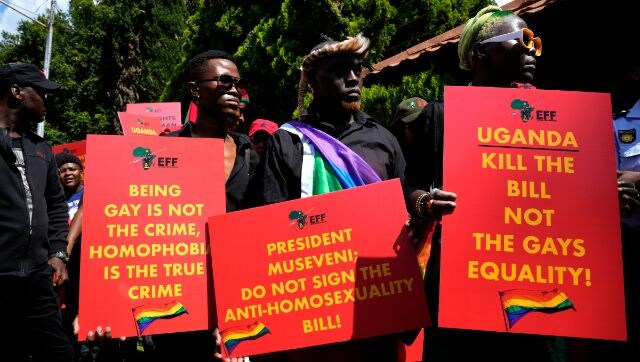Uganda's president signs severe anti-gay legislation into law with death penalty in some cases
The measure approved by President Yoweri Museveni does not criminalise LGBTQ people, which was a major worry for activists who called an earlier draught of the legislation an atrocious assault on human rights

Activists hold placards during their picket against Uganda's anti-homosexuality bill at the Ugandan High Commission in Pretoria, South Africa. AP File
Uganda’s president has signed severe new anti-gay legislation into law, which has been heavily denounced by rights campaigners and others throughout the world.
The measure approved by President Yoweri Museveni does not criminalise LGBTQ people, which was a major worry for activists who called an earlier draught of the legislation an atrocious assault on human rights.
However, the new law retains the death sentence for “aggravated homosexuality,” which is defined as sexual encounters involving persons afflicted with HIV, as well as adolescents and other vulnerable people.
According to the law, a suspect convicted of “attempted aggravated homosexuality” might be imprisoned for up to 14 years.
Parliamentary Speaker Anita Among said in a statement that the president had “answered the cries of our people” in signing the bill.
“With a lot of humility, I thank my colleagues the Members of Parliament for withstanding all the pressure from bullies and doomsday conspiracy theorists in the interest of our country,” the statement said.
Museveni had returned the bill to the national assembly in April, asking for changes that would differentiate between identifying as LGBTQ and actually engaging in homosexual acts. That angered some lawmakers, including some who feared the president would proceed to veto the bill amid international pressure. Lawmakers passed an amended version of the bill earlier in May.
Homosexuality was already illegal in Uganda under a colonial-era law criminalizing sexual activity “against the order of nature.” The punishment for that offence is life imprisonment.
The US has warned of economic consequences over legislation described by Amnesty International as “draconian and overly broad.”
The leaders of the UN AIDS program, the US President’s Emergency Plan for AIDS Relief and the Global Fund in a joint statement Monday said they “are deeply concerned about the harmful impact” of the legislation on public health and the HIV response.
“Uganda’s progress on its HIV response is now in grave jeopardy,” the statement said. “The Anti-Homosexuality Act 2023 will obstruct health education and the outreach that can help end AIDS as a public health threat.”
That statement noted that “stigma and discrimination associated with the passage of the Act has already led to reduced access to prevention as well as treatment services” for LGBTQ people.
Anti-gay sentiment in Uganda has grown in recent weeks amid news coverage alleging sodomy in boarding schools, including a prestigious one for boys where a parent accused a teacher of abusing her son.
The February decision of the Church of England’s national assembly to continue banning church weddings for same-sex couples while allowing priests to bless same-sex marriages and civil partnerships inflamed many in Uganda and elsewhere in Africa.
Homosexuality is criminalized in more than 30 of Africa’s 54 countries. Some Africans see it as behaviour imported from abroad and not a sexual orientation.
Read all the Latest News, Trending News, Cricket News, Bollywood News,
India News and Entertainment News here. Follow us on Facebook, Twitter and Instagram.
